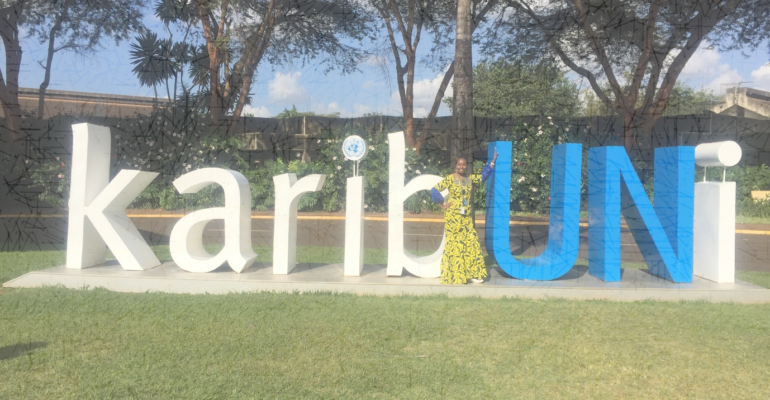Report by Mary Muia & Beatrice Oluoch, SI UN Representatives in Nairobi.
“Nature-based solutions offer the best way to achieve human well-being, tackle climate change and protect our living planet. Yet nature is in crisis, as we are losing species at a rate 1,000 times greater than at any other time in recorded human history and one million species face extinction. In addition to important moments for decision makers, including the COP 15 on Biodiversity, the 2020 “super year” is a major opportunity to bring nature back from the brink.
The 149th meeting of the Committee of Permanent Representatives to the United Nations Environment Programme took place in Nairobi, 18 February 2020. Firstly, the Secretariat of the United Nations Environment Programme announced the list of the members of the Committee who have recently joined or left the Committee of Permanent Representatives to UNEP. Click here to view the full details of appointments. In her opening speech, Ms. Inger Andersen, Executive Director of UNEP stated that “It is no surprise that many were disappointed with the headline outcomes of COP 25. We needed a massive step up in ambition on reducing greenhouse gas emissions. This did not happen. Nor did the COP deliver on finalizing the Paris Rule Book pertaining to Article 6, which means there is no market mechanism in place.
The UNEP Executive Director further tabled the quarterly report updates for the period 1 December 2019 to 31 January 2020 to the Committee of Permanent Representatives on significant political and regional developments related to UNEP’s work as well on management issues in UNEP.
Three major high lights of the report include;
• Environmental catastrophes over the last few months come on the backdrop of the 25th Session of the Conference of the Parties to the United Nations Framework Convention on Climate Change (COP 25) and are some of the all too frequent reminders of the urgent need for radical action and transformative change to safeguard a healthy environment for future generations.
• Worldwide, the consequences of environmental mismanagement are acknowledged as an issue of major concern. The World Economic Forum’s Global Risk Report 2020, which identifies the top threats facing our world, places environmental risks in all top five positions by likelihood, and in three of the top five positions by impact.
• The 2019 Emissions Gap Report, released for the COP 25, once again highlighted the need for much higher ambition and a fast closing window of opportunity. It calls for dramatic strengthening of the Nationally Determined Commitments (NDCs) in 2020 as countries must increase their NDC ambitions threefold to achieve the well below 2°C goal and more than fivefold to achieve the 1.5°C goal. You can read the full report here.

SI UN Representative in Nairobi, Mary Muia.
Amplifying the voices of Africa’s Young People for the Environment
• Through the World Youth Forum held on 15 December 2019 at Sharm El Sheikh, Egypt, UNEP, in collaboration with the Government of Egypt, supported Africa’s youth to showcase their work on climate action in the region.
• The findings of the Africa edition of the Sixth Global Environment Outlook (GEO-6) for Youth were discussed by the youth at the Forum. The report’s messages reflect the voices of youth from various backgrounds on several areas at the centre of global and regional environmental discourse.
• The Forum noted that it is imperative for policymakers and other stakeholders to work closely with young people in seeking solutions and driving actions for the current environmental emergencies in Africa.
• The youth constitute a significant proportion of Africa’s population, and are the foundation of future generations that will experience the impacts of our current environmental decisions. They are also pivotal in the creation of transformational leadership for the environment that will benefit people and the planet
Positive progress in turning the tide on single-use plastics waste:
UNEP has been working closely with governments across Africa to explore solutions to reduce the mounting plastic waste, in a manner that provides benefits for nature and people.
• These include efforts to reduce and eventually do away with single-use plastics, coupled with robust circular economy interventions.
• Part of these collaborative interventions led to a legislative process in Senegal, which resulted in the tabling of a bill outlawing single-use plastics, in various phases. Senegal’s National Assembly passed the bill in the first week of January 2020. This decision was preceded by the Circular Economy Conference that was held in Dakar in July 2019. The Africa Waste Management Outlook (2018) reported that, by the year 2025, Senegal would be one of the ten African countries most affected by the proliferation of plastic waste if no suitable interventions are instituted. There are selected learning points from the Mid-term Evaluation of the “Clean Seas Campaign”:
Lesson 1: The Campaign shows it is possible for UNEP to shape and promote clear and salient messages through media and online channels and ensure that these are promoted and shared widely.
Lesson 2: It is possible for a Campaign to use clever and globally relevant communications techniques to become part of a wider movement for change and move the conversation away from traditional Northern audiences.
Lesson 3: A broader, more widely-owned strategy, properly resourced, should have been agreed and followed through from the outset in anticipation of success. Success beyond expectations created opportunities, which have not always been capitalized upon to full effect.
Lesson 6: Demonstrating success and linking it to the Campaign required a coherent and consistent overview of the logic of the Campaign, informing the setting of a baseline and ways to track progress that would support making real-time judgements to strengthen the Campaign’s results.
UNEP @50 Commemorations:
In regards to Agenda item 4: Implementation of paragraph 8 of UNEA Decision 4/2, Kenya and Sweden see three areas in which the world community can come together and make a difference:
• firstly, by promoting a more systematic approach to many of the environmental challenges that the world is facing today;
• secondly, by further strengthening UNEP and its role in the context of the Rio+20 Outcome Document, including by enhancing and strengthening the environment in the UN-system as well as by promoting the science-policy interface;
• thirdly, by accelerating action and implementation to meet the ambitious goals the world has set for itself on environment and climate through multilateral agreements and in the context of Agenda 2030.
To this end, both countries see an opportunity to kick start UNEP @ 50 commemorations during UNEA 5 in February 2021, with the attendance of all the Ministers of the Environment and leaders of the global environmental community, and chart a course towards the UN High Level political meeting in Stockholm 2022.
Both countries also recognize that such an approach for the commemoration of the 50th anniversary of UNEP should be subject to consultations with Member States in accordance with decision 4/2 of UNEA 4. 5. Sweden and Kenya look favorably upon UNEP serving as the Secretariat of both the UN High Level political meeting as well as of UNEP @ 50 commemorations in order to ensure coherence and consistency.
In Conclusion, it is feasible for Soroptimistst International (SI) to seek partnerships and collaboration with Kenya for inclusion in the preparations so as to engage and be visible in the UNEP@50 commemoration side events”.

